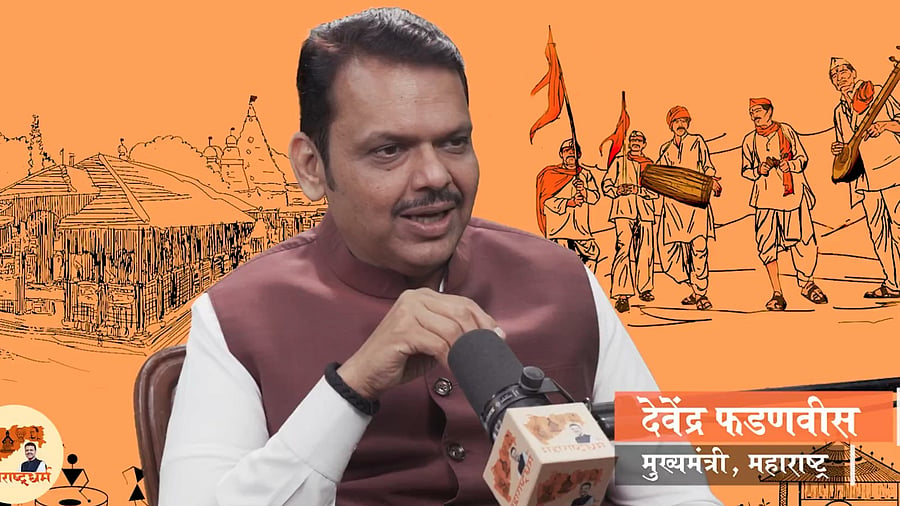
Maharashtra CM Devendra Fadnavis speaks during podcast.
Credit: X/@Dev_Fadnavis
Mumbai: Coinciding with the auspicious occasion of Ashadi Ekadashi, Maharashtra Chief Minister Devendra Fadnavis, a tech-savvy politician, launched a podcast in which he spoke of Maharashtra’s culture, ethos, the great leaders of the state and the importance of Marathi.
Maharashtra bridges North and South India, he noted.
The CM addressed a series of questions in an interaction with veteran author, thinker and scholar of saint literature Dr Sadanand More, during the nearly 25-minute podcast.
The podcast comes in the backdrop of the Hindi-Marathi political row in Maharashtra.
During his first tenure as CM from 2014 to 2019, Devendra Fadnavis had hosted a television show "Mi Mukhyamantri Boltoy".
Now into his third term as CM, he will connect with people through the increasingly popular medium of podcast with a series called ‘Maharashtra Dharma’. Information about the podcast was shared via Fadnavis' social media handles.
The first episode is titled "Maharashtra Dharma: Foundation and Formation", launched on the auspicious occasion of Ashadhi Ekadashi.
It covers topics ranging from the Ramayana and Mahabharata, to the teachings of Lord Gautam Buddha, and the foundations and evolution of Maharashtra’s spiritual journey.
“The history of Maharashtra is glorious — and it is also a responsibility. Though we may not be the direct descendants of Sant Dnyaneshwar, Chhatrapati Shivaji Maharaj, Krantijyoti Savitribai Phule or Bharat Ratna Dr Babasaheb Ambedkar, we are the carriers of their intellectual legacy. With their knowledge, sacrifice, and courage, they shaped this state. Preserving, nurturing, and advancing it is our duty. Maharashtra Dharma is not mere nostalgia — it is our moral compass. Understanding who we are and determining what we want to become — that is Maharashtra Dharma,” said the veteran BJP leader with RSS upbringing.
"Maharashtra Dharma is not a religion — it is a living code of ethics. It urges us to think wisely, act with service, and stand with courage. From Dnyaneshwar’s verses to Shivaji Maharaj’s sword, from Phule’s bravery to Dr. Babasaheb Ambedkar’s vision, this chain has never broken. It has always moved forward,” he said. “Gautam Buddha’s message of peace also resonated in this land. The teachings were not just heard, but carved into stone by monks in the serene hills of Ajanta. The divine energy of this land attracted seekers, saints, and philosophers. Shankaracharya, who travelled across India, established the Karveer Peeth here. Goddess Mahalakshmi resides here. Maharashtra thus bridges North and South India,” he said.
About Ramayana and Mahabharata, he said: “The story of Maharashtra begins with divine footsteps. It is mentioned in the Ramayana, during Lord Rama’s exile. The Dandakaranya forest mentioned then extended from Vidarbha to Nashik-Panchavati. The Mahabharata too has references to this land. The tale of Damayanti unfolded in Vidarbha. Arjuna is believed to have meditated in caves along the Konkan coast. Rukmini’s abduction and the ensuing war by Lord Krishna happened in Vidarbha. The Pandavas lived in exile in Chikhaldara. The fall of Keechak was a tale of truth triumphing over tyranny — a saga of Maharashtra’s land.”
On the social reform movements, he said: “Mahatma Jyotiba Phule challenged caste, patriarchy, and superstition. His wife, Krantijyoti Savitribai Phule, redefined courage through her pioneering work in women’s education. Lokmanya Tilak gave Maharashtra a political voice, transforming tradition into resistance through Ganesh festivals and journalism. His slogan, "Swarajya is my birthright and I shall have it", became a people’s movement. Bharat Ratna Dr. Babasaheb Ambedkar, with intellect and study, overcame discrimination and became the architect of India’s Constitution. From Mahad Satyagraha to educational reform and caste eradication, this was a moral revolution.”
Fadnavis added that Pandita Ramabai campaigned for the rights and education of widows. Gopal Ganesh Agarkar challenged rituals and dogmas. Sant Gadge Baba linked cleanliness of body and soul. Karmaveer Bhaurao Patil established hostels and schools for the marginalized. Rashtrasant Tukdoji Maharaj taught rural Maharashtra life lessons through his Gram Gita.